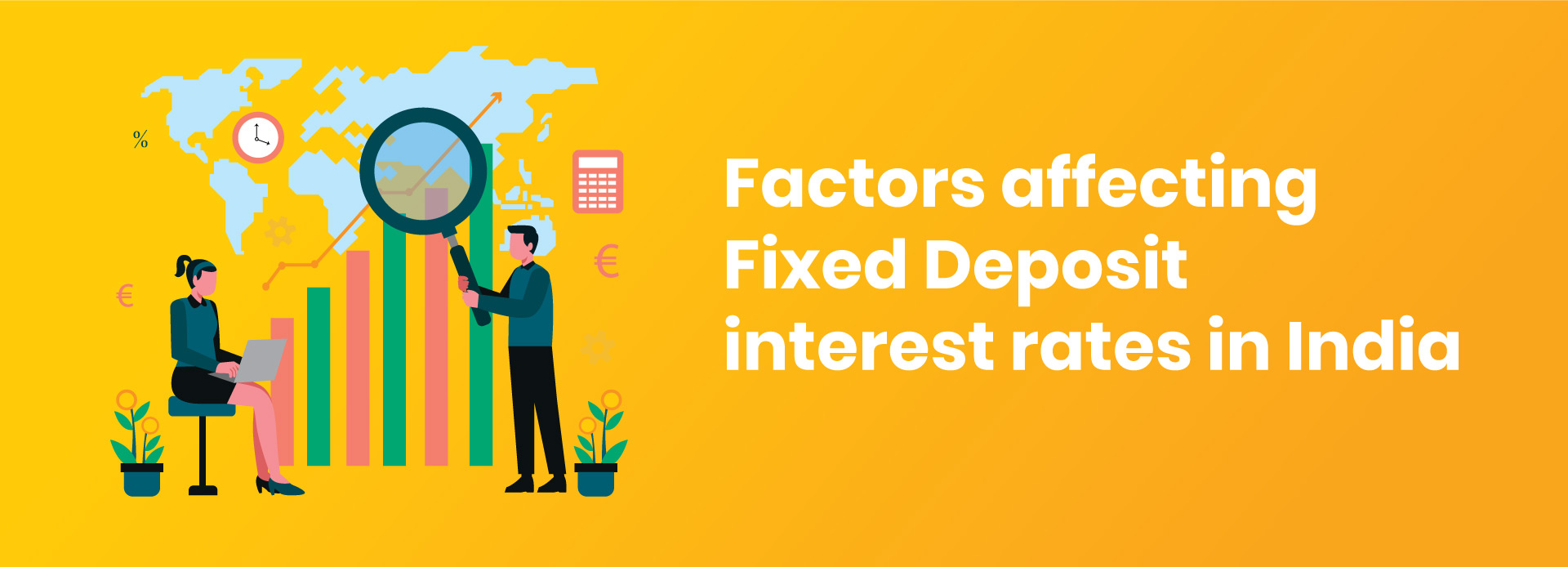
Factors affecting Fixed Deposit Interest Rates in India
27 June 2024 | By INDIE
Fixed Deposits (FDs) have always been a safe choice of investment for majority of Indians. They are a popular choice among investors who do not want their money stuck in high-risk instruments. FDs also offer guaranteed returns over a fixed tenure thus being a reliable instrument. This is one of the primary points considered while investing in FDs.
The FD interest rate varies from bank to bank and other financial institutions. The interest rate is affected by various factors, economic and others. Make sure to consider these factors before opening an FD account so as to make informed decisions and maximize your returns.
The factors affecting FD interest rate in India are as follows:
1. Economic Conditions
During economic conditions like inflation and recession, interest rates fluctuate. In case of Inflation, banks offer higher interest rates to minimize the impact of rising prices. During recession times, the rates are lowered to maximize borrowing and lending activities.
2. Repo rate
Repo rate is the rate at which the Reserve Bank of India lends money to other banks. The FD rates are directly proportional to the Repo rates. Higher Repo rates result in high FD rates and lower Repo rates lead to low FD rates. Knowledge of these rates will help you to choose the right time to invest in FDs to get maximum benefit.
3. Demand and Supply
The demand and supply chain in the country’s economy also has a huge impact on deciding the rate of interest. If there is a high demand for money in the market, the interest rates tend to be higher. If there is excess supply, then the interest rates tend to fall.
4. Liquidity Position of the Bank
The rate of interest varies from bank to bank depending on the bank’s liquidity. If the bank needs funds, it will offer higher interest rates to lure more customer.
5. Tenure of Fixed Deposit
The duration of the FD also determines the rate of interest offered on it. The longer the duration, higher the interest rate. Short duration deposits do not earn high rate of interest.
6. Market Competition
Banks and financial institutions often like to keep rates competitive which makes them fluctuate within limits.
7. Taxation Policies
Taxation policies, rules, and amendments can directly influence the returns you get on your investment in FDs.
8. Age
The age of the investor also plays a role; as senior citizens are offered a comparatively higher rate of interest on FDs.
9. Investment Type
Cumulative FDs give a cumulative amount along with the interest amount at the end of a fixed tenure, whereas non-cumulative FDs offer frequent interest payouts. Cumulative FDs have higher returns than non-cumulative FDs.
10. Credit Rating
Banks/Financial Institutions with higher credit ratings assure security and stability along with higher returns.
Also Read: What Is Fixed Deposit Laddering
FDs are very good investment options for beginners and risk-averse investors. They play an important role in an individual’s financial journey. Knowledge of the above-mentioned factors affecting the fixed depositrates will help you in making informed and planned decisions to park your funds in Fixed Deposits. It is crucial to research all the major factors so as to maximize your savings and get benefits.
Always ensure to make deposits with reputable institutions. Consider the tenure, your financial needs and the cumulative amount that you will receive at the end of the tenure. Keep in mind the inflation rate and taxation policies. Your decision-making should be guided by your knowledge of fixed deposit, factors affecting interest rates, your investment goals, your financial position, and your risk tolerance.
Fixed deposit interest rates are affected by economic and market conditions along with regulatory factors. You can strategically plan your investment path by being aware of these factors. If you choose to invest in FD, INDIE offers competitive interest rates and an easy online process to help you with your financial journey.
Disclaimer: The information provided in this article is generic and for informational purposes only. It is not a substitute for specific advice in your circumstances. Hence, you are advised to consult your financial advisor before making any financial decision. IndusInd Bank Limited (IBL) does not influence the views of the author in any way. IBL and the author shall not be responsible for any direct/indirect loss or liability incurred by the reader for making any financial decisions based on the contents and information.




